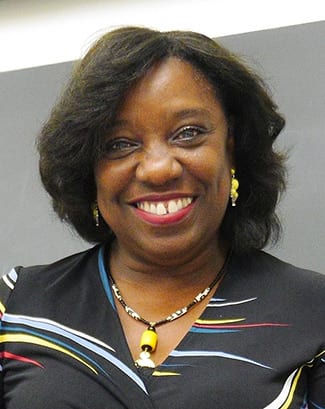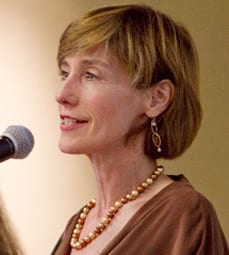By Andrew Cohen

Judge Trina Thompson ’86 is guided by her fervent belief that American society is only as successful as its most vulnerable: our youth. Her passion for protecting and advancing that population will be evident September 16, when Berkeley Law kicks off its annual Alumni Reunion Weekend. A series of educational panels and festive events are planned for all interested graduates, with intimate dinners scheduled for classes ending in 1 and 6.
A judge on the Alameda County Superior Court, Thompson will join a panel on The Future of Juvenile Courts and the Decriminalization of Poverty. It marks one of many intriguing events available to alums during the weekend festivities.
Studies show that the impact of the disproportionate arrests of young people who are of color or poor has spread to school performance, family stability and employment. Thompson hopes that promising developments in Alameda County, fueled by Berkeley Law students and faculty research, can offer a model of juvenile justice reform better tailored to the needs of youth, families and communities.
A recent report by Berkeley Law’s Policy Advocacy Clinic showed that families with an African-American juvenile on probation in Alameda County were liable for about $3,438 in fees—more than twice that of white families ($1,637). The clinic’s Stephanie Campos-Bui ’14 and Ahmed Lavalias ’17, Thompson’s fellow panelists, played key roles in persuading the county to impose a moratorium on fees against families with children in its juvenile justice system—the first in the country to do so.
“Berkeley Law, much like Alameda County, has some of the most visionary and creative thought leaders in the nation,” Thompson said. “It’s our hope that this interactive discussion will identify the historical impediments to decriminalizing childhood poverty, as well as solutions that can be shared in the private and public sector.”
While Thompson noted that the number of youth in Alameda County’s juvenile facilities has decreased significantly, she said “we still need to do a better job with our ‘aging out youth’ and help them to become stable and self-sustaining adults. They feel the brunt of a vibrant housing market that doesn’t include any plans for affordable housing or an infrastructure for youth employment.”
The juvenile court panel also features Kate Weisburd, director of the East Bay Community Law Center’s Youth Defender Clinic, and Laura John Ridolfi ’05, director of policy for the W. Haywood Burns Institute for Juvenile Justice Fairness & Equity. Topics will include undocumented minors from the lens of impoverished youth separated from their parents, and the over-medicating of state-raised youth and how that impacts their ability to become self-sustaining adults.
Courting change
Alumni Reunion Weekend will begin with a timely look at the U.S. Supreme Court. Berkeley Law constitutional scholars will discuss the impact of Justice Antonin Scalia’s death, the refusal to consider Merrick Garland’s nomination, and major changes that could result from the 2016 presidential election. Moderated by Jordan Bock ’17, the panel will also assess recent Supreme Court decisions and their long-range impact.

“It’s always fun to talk about the court—especially with colleagues and alumni,” said Kevin Quinn, a panelist with Berkeley Law Professor Bertrall Ross and Interim Dean Melissa Murray. “I think the audience will get a variety of distinct but complementary perspectives on the court’s 2015 term.”
Quinn noted that November’s election outcome will have an even more significant impact than usual on the court, given the advancing ages of Justices Stephen Breyer, Anthony Kennedy and Ruth Bader Ginsburg. They will be 78, 80 and 83 years old, respectively, when the next president is sworn in.
“The next president could very well have the ability to appoint four or more justices,” Quinn said. “Even before Justice Scalia’s departure there was some evidence that the court had been moving somewhat to the left. Losing Scalia has undoubtedly weakened the conservative wing of the court. However, the biggest effect of having an eight-member court for most, if not all, of the upcoming 2016 term may be that relatively few contentious high-profile cases will be decided.”
Always innovating
An afternoon Lawyering for Innovation panel will feature tech industry leaders, faculty, alumni and students for a discussion on law’s role in sparking entrepreneurship among startups. In addition to having the nation’s top-ranked intellectual property law program in 17 of the past 19 years, the school last year launched Startup@BerkeleyLaw, which supports students interested helping new ventures confront key legal issues.

Former Apple general counsel Nancy Heinen ’82 joins Orrick global chairman and CEO Mitch Zuklie ’96 and Zymergen, Inc. VP and general counsel Duane Valz ’96 on the panel with Professors Robert Bartlett and Robert Merges and student Kelsea Carlson ’18. “There are many avenues for lawyers to engage in the innovation economy,” said Heinen, now a strategy consultant and board advisor with the Silicon Valley Social Venture Fund.
Heinen herself has worn numerous hats: private practice lawyer serving startups and venture capitalists, general counsel and senior executive, venture philanthropist, investor, advisor, mentor and board member for both nonprofit and for-profit entrepreneurs.
She joined the advisory board of the Berkeley Center for Law and Business to “create pathways for students to successfully navigate a global, interconnected multidisciplinary world, and to make Berkeley Law a center of excellence for business law scholarship and groundbreaking leadership,” she said. “But it’s the energy and ambitions of the students that keeps me coming back.”
Heinen believes that Berkeley Law’s connection to the blossoming startup scene on campus and in the Bay Area—as well as its “commitment to recruit and educate diverse students”—will deepen the roster and capabilities of lawyers who are eager to help startups soar.
“Many of the world’s toughest problems will be solved on a grassroots, bottoms-up basis by entrepreneurs envisioning solutions that don’t currently exist,” she said. “Startups have unique challenges because they operate in a ‘what might be’ space, not a ‘what is’ space. They need lawyers who can provide guidance navigating complex business environments and developing frameworks that bring innovative solutions to those they intend to serve.”
Each of the three panels offers 1.5 hours of MCLE credit.
In addition to the panels, Alumni Reunion Weekend offers a wide range of engaging events. Alums can register here and enjoy an agenda that includes:
- A Town Hall with Interim Dean Murray, who will lead an open Q&A forum about the state of the law school and deliver a “First 100 Days” report that shares her thoughts on how Berkeley Law can best maximize its potential.
- An impact fair and lunch where alumni can reconnect with the law school’s student organizations, affinity groups, centers and clinics to learn about current research and community service work.
- A plaque dedication honoring beloved community member Joyce Hall, who managed the bookstore for 25 years. Hall died in December 2015.
- An all-class cocktail party; reunion dinners for classes ending in 1 or 6; a post-dinner reception and dance party; brunch with faculty; law school, campus and Berkeley Art Museum and Film Archive Tours; a tailgate, watch party and post-game reception for the Cal-Texas football game; and outings to that game as well as the following day’s baseball game at AT&T Park between the San Francisco Giants and St. Louis Cardinals.